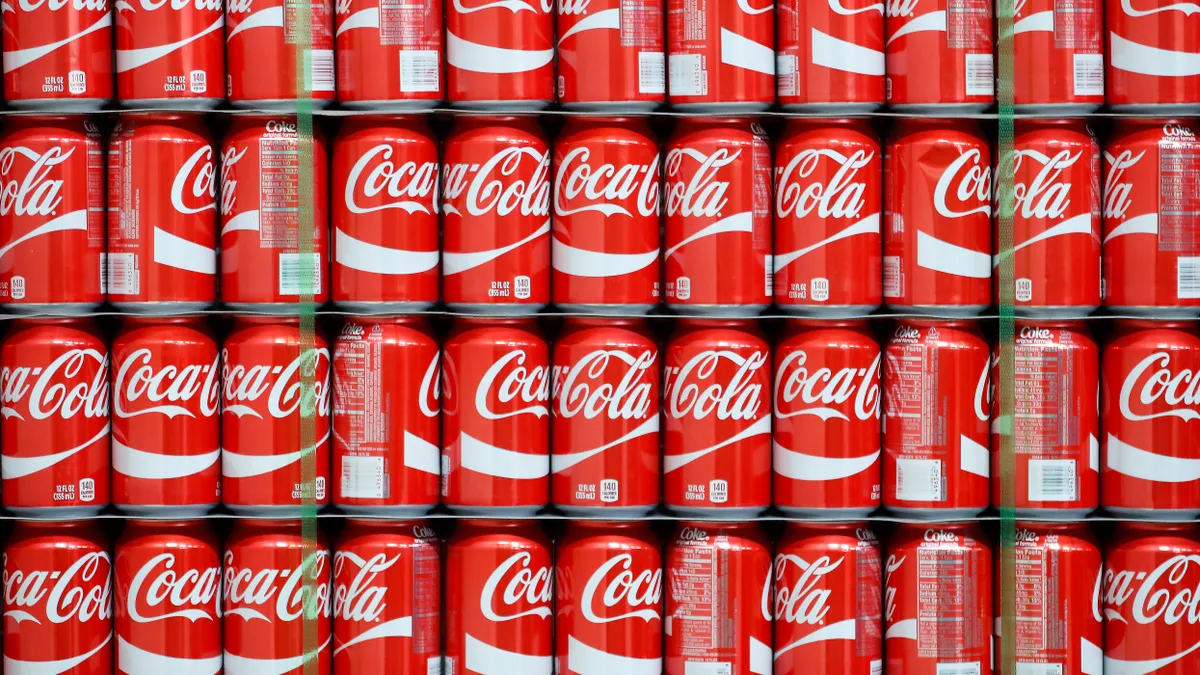Dive Brief:
- Coca-Cola is using three bulk vessels to ship materials, a way of "thinking outside the box (or container)" and keeping goods moving while vessel space is limited, Alan Smith, procurement director of global logistics at The Coca-Cola Company said in a LinkedIn post on Friday.
- There are three bulk vessels being loaded this week "to keep our production lines running across the world," Smith said. The ships are carrying more than 60,000 tons of material, which is approximately 2,800 TEUs, and are "heading to some non-congested ports" to avoid delays.
- The bulk vessel shipments are the first of many, according to Smith, and a "prime example of excellent collaboration between our procurement teams, our supply chain partners and our suppliers."
Dive Insight:
Shippers are finding creative ways to get cargo moving amid a congested ocean shipping environment.
Coca-Cola is not the first to turn to nontraditional methods for ocean shipping. Costco, The Home Depot, and Ikea are among some of the retailers who began leasing their own containers and chartering ships in order to gain control over their supply chain and get their products into the U.S.
But chartering container ships is not a silver bullet to get around supply chain delays. Many U.S. ports are still congested, so adding more ships does not guarantee smooth transportation for shippers.
"Operational capacity at ports can't be increased quite as easily. With ports already overwhelmed, those additional ships are contributing to the climbing number of vessels floating outside the ports of LA/Long Beach and now to a growing backlog off the coasts of Shanghai and Ningbo as well," Judah Levine, head of research at Freightos, said in an emailed analysis on Thursday.
Bulk vessels are often used for dry cargo that are loaded loosely instead of packaged, making the ships an unusual choice for transporting containerized good. Photos shared on LinkedIn by Smith show Coca-Cola products wrapped in plastic to facilitate bulk transport.
Coca-Cola is hoping its decision to avoid non-congested ports will allow "for a smooth discharge," Smith said in the comments. The company is also avoiding congestion to avert "mega" detention & demurrage fees that could come from holding on to a chartered ship for too long, Smith added.
As of Tuesday morning, more than 50 ships in total were waiting at anchor at ports in Los Angeles, Long Beach, Savannah, New York and Newark, New Jersey, according to data emailed by project44. At the Port of Los Angeles, some ships have been waiting at anchor for as long as 18 days, according to Port Optimizer data.
An analysis by Sea-Intelligence suggests those delays are contributing to the vessel capacity crunch shippers are experiencing.
"We are now at a point where 12.5% of the global capacity was unavailable in August due to delays. In nominal terms, this means that in August 2021, a full 3.1 million TEU of nominal vessel capacity was absorbed due to delays," according to Sea-Intelligence.
The dynamic is driving up ocean freight rates, too.
"At this point there actually is enough capacity to meet demand," Levine said Wednesday via email. "The reason rates are still sky-high and space is difficult to secure is that so much of that capacity is being sapped by port congestion and delays."
Commenting on Coca-Cola's move, Levine added actions by individual companies are unlikely to shift market dynamics, but the trend shows "just how impacted and overstretched logistics are."
For shippers, chartering ships is an alternative to high spot rates and limited vessel capacity, Ricardo Ungo, director of Old Dominion University's Maritime, Ports, and Logistics Institute, said in September.
"Even if they're paying more, they're still not getting the goods on time," said Ungo. "It makes sense to try to take control of the delivery, and that's why the big companies are taking steps to charter those vessels."
Editor's note: This story was first published in our Logistics Weekly newsletter. Sign up here.














